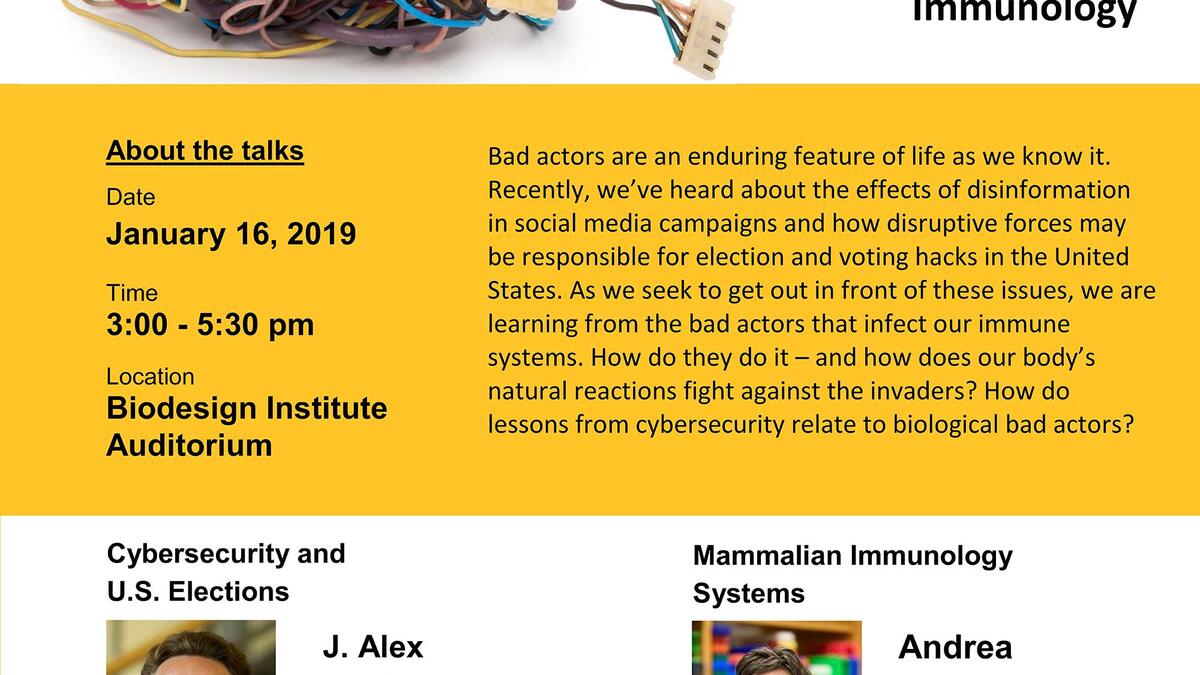Protecting U.S. elections against attack: What does biology have to do with it?

"Dialogues in Complexity, Protecting Against Bad Actors: From Election Security to Immunology” will be held Jan. 16 from 3-5:30 p.m. and will feature researchers prominent in the fields of cybersecurity and immunology.
Most of us think of cybersecurity and biology as distinct areas of study. To better understand how we might apply principles of immunology to developing safeguards against cyberattacks, researchers are looking to ways in which the immune system of humans and other mammals naturally combats pathogens.
In the first “Dialogues in Complexity” lecture at Arizona State University, national experts will present their insights related to this emerging field of study. “Protecting Against Bad Actors: From Election Security to Immunology” will explore how “bad actors” — whether they be pathogens or hackers — contribute to the disruptive forces in U.S. elections and our immune systems.
At the Jan. 16 event, J. Alex Halderman of the University of Michigan will discuss cybersecurity and U.S. elections and Andrea Graham of Princeton University will discuss mammalian immunology. The event will take place from 3 to 5:30 p.m. at the Biodesign Institute Auditorium and is free and open to the public.
“The problem that the immune system solves for the body is roughly the same problem we would like cybersecurity systems to solve,” said Stephanie Forrest, director of the Biodesign Center for Biocomputing, Security and Society. Forrest is also a professor of computer science at the School of Computing, Informatics, and Decision Systems Engineering. Forrest and her team focus on the interconnectedness of biological systems and cybersecurity.
“Over the years, computer security has discovered willy-nilly many of the same ideas we see in biological systems,” Forrest said. “So the question is: Where do the parallels exist today, and how might we think about those parallels more deeply to understand new ideas for cybersecurity?”
“There should be general principles that govern what kinds of threats emerge and what kind of defenses evolve to protect against those threats. We need to ask ourselves: Are there general principles that govern malicious behaviors in systems? How do we defend against them?”
The lecture series is a result of a partnership between Forrest, Graham, Simon A. Levin and Ann Kinzig. Levin is the James S. McDonnell Distinguished University Professor at Princeton University, and the namesake of ASU’s Simon A. Levin Mathematical, Computational and Modeling Sciences Center. Ann Kinzig is a senior sustainability scientist with ASU’s Julie Ann Wrigley Global Institute of Sustainability and a professor in the School of Life Sciences.
Cybersecurity and U.S. elections
Halderman will describe how cyberattacks on U.S. voting infrastructure threaten the integrity of elections and stand to undermine confidence in democratic processes. He will also discuss recent efforts to defend against disruptions to U.S. voting, touching specifically on the cyberattacks that occurred in the 2016 presidential election and Congress’s decision to provide $380 million in funding to develop safeguards in the voting process.
Halderman has spearheaded numerous projects aimed at staving off cyberattacks that could threaten the voting process. After the 2016 election, he served as an adviser on recount initiatives in three states, and he testified in 2017 to the U.S. Senate Intelligence Committee regarding cybersecurity threats to the election process.
“Alex Halderman is one of very few people, especially in academia, who is deeply skilled and knowledgeable in technical cybersecurity issues and knowledgeable and interested in policy,” said Forrest. "His talk will highlight security issues related to our current election practices and offer suggestions for how they may be addressed."
Mammalian immunology systems
Graham will discuss mammalian immunology systems and the complex dynamics of host-parasite transmission. Graham specifically studies the driving forces of heterogeneity in hosts, parasites and disease, and with her research, she addresses how natural selection has changed host defense and parasite transmission.
“Graham’s talk will give an overview of both the promise and perils of mammalian immune defense systems,” Forrest said.
The main goal of the event is to expose the public to the important connections between biological and cyber defenses.
“I want the audience to see these topics in the same space, and to reinforce our public interest in securing our democracies,” Forrest said. In addition to the public event, a small group of researchers will convene to discuss “what is known about how biological systems defend themselves and the many cybersecurity methods that have been devised to protect computational systems,” according to Levin.
“We hope to identify commonalities, differences, gaps and outstanding questions, ultimately producing a unified understanding of how complex systems defend themselves against a variety of threats and perturbations,” he said.
ASU students or staff are urged to attend. RSVPs are encouraged as space is limited.
More Science and technology

Cracking the code of online computer science clubs
Experts believe that involvement in college clubs and organizations increases student retention and helps learners build valuable…
Consortium for Science, Policy & Outcomes celebrates 25 years
For Arizona State University's Consortium for Science, Policy & Outcomes (CSPO), recognizing the past is just as important as…

Hacking satellites to fix our oceans and shoot for the stars
By Preesha KumarFrom memory foam mattresses to the camera and GPS navigation on our phones, technology that was developed for…